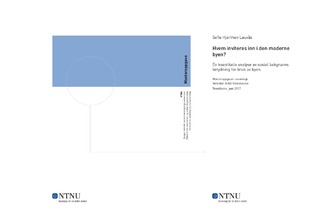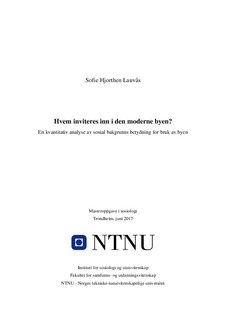| dc.description.abstract | Over the last decades Norwegian (and western) cities have undergone a massive transformation, where the sparsely inhabited and traffic-based city has changed into a compact, sustainable and cultural area for living, working and walking. However, this transformation and upgrade of urban areas has led to an extensive gentrification of the city – where former working class areas have become attractive neighbourhoods for the educated and creative middle class. The modern city has therefore been criticized for excluding groups based on social background. This thesis addresses modern city planning and its potential social consequences through an investigation of the correlation between social background and the use of urban activities – mainly related to culture, recreation and movement. The data consists of data from three different surveys (Levekårsundersøkelsen 2007, Undersøkelse om folks forhold til kommunen 2008 and Ungdata 2010-2015). To discuss my findings, I apply geographical theorizations regarding “place”, presented by Relph, Rose and Cresswell, in addition to Bourdieu’s theory of class and power.
My findings show that social background (mainly education) have a positive effect on the use of cultural activities, and a negative or no effect on the recreational activities. Based on this I argue that the cultural city may be more accessible and attractive for those with a higher cultural capital, and therefore easier to identify with for the middle class. I extend this discussion with a description of other tendencies in modern city planning (image building and innovative workplaces) to show that my findings probably relate to not only the cultural city, but also other priorities in the modern city. Based on my assumption that social background correlates with many of the modern urban tendencies, I argue that the city represents a coupling of personal dispositions and place – where an exclusion based on capital not only results in an exclusion from specific activities, but the city as a whole. | nb_NO |

